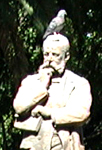Plutocracy
 I was going to submit this post weeks ago, when things seemed more settled. I was going to crow that it's official: Tombaugh be damned, Pluto is out on its cold, rocky butt, its reign of error in the Kuiper Belt reduced to lordship over the "dwarf planets."
I was going to submit this post weeks ago, when things seemed more settled. I was going to crow that it's official: Tombaugh be damned, Pluto is out on its cold, rocky butt, its reign of error in the Kuiper Belt reduced to lordship over the "dwarf planets."But I'm glad I held off. Things have gotten wierder.
Where to begin? How about a very fine commentary in the Planetary Society website on the insider haggling over how to define a planet. I second the commentator on how the debate provides a great opportunity to see one segment of the scientific community in action. Science, in this salutary view, is less about establishing truth for all time than constantly, self-critically struggling to know more and better, to get closer to the truth.
I would go even further. The Pluto/planet controversy is also a great venue for presenting science studies--a self-reflexive attempt to understand Science as a situated human endeavor--to nonexperts. The controversy is important independent of the quality of the scientific work informing any resulting definition. It provides a view of and a way in to science for nonscientists.
It's far from a bad thing for nonexperts to witness the messiness of actual scientists' practice, which was a fear of some astronomers in re: Pluto. The personal stakes in impersonal data and hypotheses. The rounds of consensus-building, even voting. The personification of the ex(?)-planet and how "he" might feel about losing "his" status. And, now, an uprising of disenfranchised planetologists with a competing definition. (See the text of the definition yourself, though don't be shocked if the experts don't crowd around to hear your assessment of their work.)
The Pluto battle also provides us a valuable lesson on how experts and nonexperts relate so differently to scientific knowledge, always vulnerable to revision or deletion, never free from the inertia of the paradigm or the tug of "external" cultural and economic forces. A self-identified nonexpert "Pluto fan" put it quite reasonably in a NY Times interview:
“It’s just the natural progression of things...The more you learn, the more assumptions are going to get turned upside down. It’s just part of science. And life.”It's been fascinating to hear, in piecemeal but evocative fashion, how the wider public reaction to the expert debate and its outward-rippling concomittants is reported/shaped by the popular science press. "Honk if Pluto is a planet" bumper stickers and laments that "we have to change the textbooks" (no small practical and financial matter, it should be noted) show how a minor celestial cousin nevertheless connects to a web of symbolic and material significance for many humans that will surely respond if tugged.
I'm with the astrologers on this one...or at least one who deigned to be consulted by a member of the press corps. It doesn't mean dick to the cosmos how we think of it. We didn't know Pluto was there before 1930, we debated it for decades afterwards, and have only ourselves to blame for working it so cozily into our mental maps that it disturbs us to refile it.
Meanwhile, he just keeps loitering out there. Waiting. Plotting.


0 Comments:
Post a Comment
<< Home